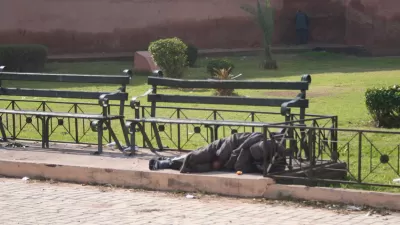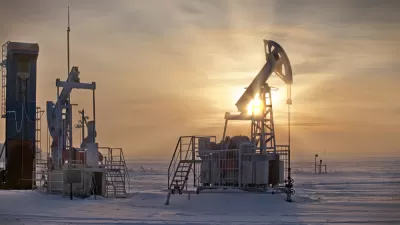A new report from the Human Rights Council of the United Nations chastises the United States for allowing so many Americans to live in poverty.

"A new United Nations report is getting plenty of national media attention for predicting President Trump will exacerbate hardships for America's poor by weakening the nation's safety net," reports Jeff Stein.
Here are the headlining stats about the conditions of poverty in the United States:
- 40 million Americans living in poverty.
- 18.5 million Americans living in "extreme poverty."
- 5 million Americans living in "Third World conditions of absolute poverty."
- 13.3 million American children living in poverty.
The report, titled "Report of the Special Rapporteur on extreme poverty and human rights on his mission to the United States of America" [pdf], is notable for also describing worsening conditions for impoverished Americans even before the Trump Administration came into power. "These statistics largely 'could not reflect the policies of the Trump administration,' since the best existing poverty data predates his inauguration, said the author of the report, Philip Alston, U.N. special rapporteur on extreme poverty and human rights, in an interview," writes Stein. Still, the report says the poverty and human rights failings of the United States is the fault of the political class, and experts are already following up the findings of the report with predictions that Trump Administration will exacerbate the problems of poverty, despite the improving economy.
FULL STORY: An explosive U.N. report shows America’s safety net was failing before Trump’s election

Alabama: Trump Terminates Settlements for Black Communities Harmed By Raw Sewage
Trump deemed the landmark civil rights agreement “illegal DEI and environmental justice policy.”

Planetizen Federal Action Tracker
A weekly monitor of how Trump’s orders and actions are impacting planners and planning in America.

The 120 Year Old Tiny Home Villages That Sheltered San Francisco’s Earthquake Refugees
More than a century ago, San Francisco mobilized to house thousands of residents displaced by the 1906 earthquake. Could their strategy offer a model for the present?

In Both Crashes and Crime, Public Transportation is Far Safer than Driving
Contrary to popular assumptions, public transportation has far lower crash and crime rates than automobile travel. For safer communities, improve and encourage transit travel.

Report: Zoning Reforms Should Complement Nashville’s Ambitious Transit Plan
Without reform, restrictive zoning codes will limit the impact of the city’s planned transit expansion and could exclude some of the residents who depend on transit the most.

Judge Orders Release of Frozen IRA, IIJA Funding
The decision is a victory for environmental groups who charged that freezing funds for critical infrastructure and disaster response programs caused “real and irreparable harm” to communities.
Urban Design for Planners 1: Software Tools
This six-course series explores essential urban design concepts using open source software and equips planners with the tools they need to participate fully in the urban design process.
Planning for Universal Design
Learn the tools for implementing Universal Design in planning regulations.
Clanton & Associates, Inc.
Jessamine County Fiscal Court
Institute for Housing and Urban Development Studies (IHS)
City of Grandview
Harvard GSD Executive Education
Toledo-Lucas County Plan Commissions
Salt Lake City
NYU Wagner Graduate School of Public Service



























